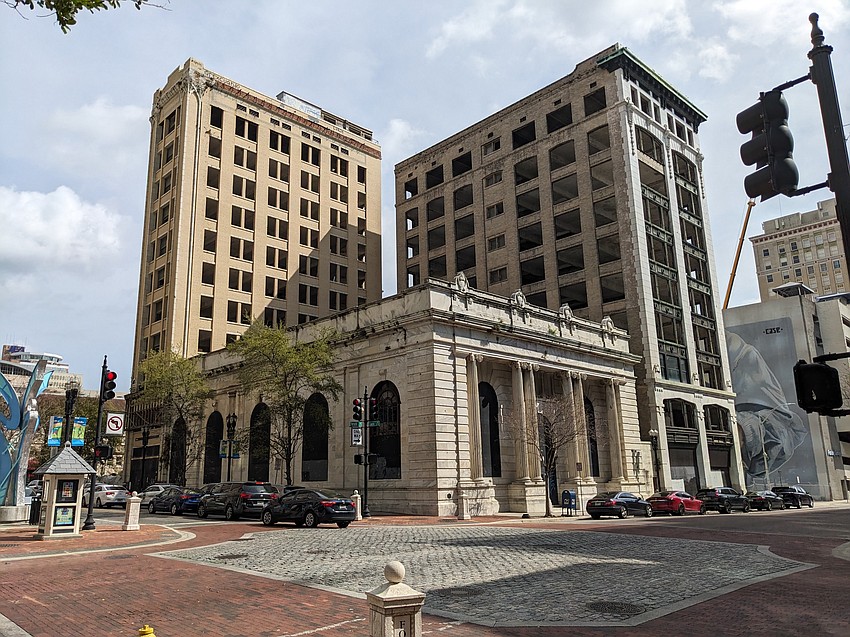
The fate of the Laura Street Trio is squarely in the hands of Jacksonville City Council members.
On June 28, the Downtown Investment Authority board voted 6-0 in favor of a resolution to end negotiations with the Trio’s developer, SouthEast Development Group, on its latest proposal to revive the three historic buildings at Laura and Forsyth streets. Member Jim Citrano was absent.
The resolution calls for the city not to entertain further incentives requests for the project unless SouthEast brings more of its own equity to the table or finds partners who can provide additional funding.
In April, the board passed a similar resolution that rejected a proposal from SouthEast but left the door open to further negotiations.

Steve Atkins, owner of the Trio and principal of SouthEast, said he disagreed with several portions of the DIA staff’s assessment of the proposal’s viability but not with ending conversations with the authority. Going into the meeting, Atkins said he wanted to deal directly with Council.
“As you heard today from the DIA, there are certain limitations that they have and inabilities that probably preclude them from doing what this project is going to require,” he said after the DIA vote.
“So I think that is probably why we need to take this up with City Council. I think that’s going to be our best and most efficient path forward.”
Council approval is needed for incentives for the buildings, but since the DIA was created in 2012 it has served as the city’s agency for negotiating incentive packages for Downtown projects and recommending them to Council.
On June 26, Council President Ron Salem asked the Special Committee on the Future of Downtown to explore options to revive the Trio.
“I’m not a developer, but everyone tells me those three buildings are critical to Downtown and we’d like to find some way that we can develop those buildings,” Salem said June 27 on the WJCT Public Media talk show “First Coast Connect.“

Atkins’ most recent proposal calls for a combination of restoration and new construction that would turn the Trio into a mixed-use complex with a hotel, multifamily residential units, restaurants, bars and retail operations. A portion of the multifamily units would be designated as affordable housing.
According to DIA documents, the estimated cost of the project is $194.2 million, with SouthEast requesting $89.9 million in city incentives.
DIA board members said the proposal exceeded the DIA’s limits on incentives and guidelines designed to protect the city from financial risk in the event of projects falling through. The proposal called for most of the incentive funding to be delivered in the early stages of the project, whereas standard DIA incentives for preservation and revitalization are awarded upon completion.
In addition, the proposal asked the city to provide 45% of the total project cost, a percentage far higher than average.
“I’d be more comfortable if the developer had more skin in the game and the city wasn’t providing so much funding up front,” board member Sondra Fetner said.

Redevelopment of the Trio is a long-running saga, with SouthEast having received two incentive packages from the city in the past seven years but being unable to capitalize on them. In both cases, the incentives were due upon completion of the project and therefore were not awarded.
The buildings, constructed in the early 1900s and vacant for decades, are exposed to the elements and are deteriorating.
In January, Council opted not to vote on a proposed redevelopment agreement introduced by member Matt Carlucci after another failed round of negotiations between the DIA staff and SouthEast. At that time, DIA and city staff expressed concerns that a component of the agreement, a $22 million city “participation” loan that would serve as a guarantee for a construction loan that Atkins had secured from Capital One, would be a violation of the Florida Constitution and that the project would subject the city to as much as $265 million in debt liability.

Council instead ordered DIA staff to return to negotiations with SouthEast, with instructions that staff could go outside of the guidelines for the authority’s incentive programs to fashion a workable agreement. The DIA offers several types of incentives that come with such requirements as a minimum private investment level and a minimum return on investment for public funding.
Carlucci, who attended the June 28 meeting, urged board members to pass the resolution.
“I have to fall back on a maxim I have, and that is, Jacksonville moves best when we move together. And I’ve got to tell you, that’s not happening here in my opinion,” he said.
Atkins said he planned to offer the proposal to the special Council committee as a starting point of its discussions.
“We had never expected the proposal that we gave would be the end-all be-all,” he said. “We anticipated some sort of response from the DIA and that we would negotiate finer points. We just never heard from them.”
Boyer said the vote offered a “clear recommendation” for Council on the proposal.
“Council certainly has a right to consider it, but I think they now have a clear recommendation from the DIA, who has both the professional staff that analyzed it and members in the industry on the board whose recommendation to Council is that this is not a deal they should proceed with on behalf of the city,” she said.
“They can choose to ignore that recommendation.”